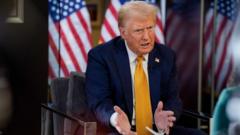Trump, in his first broadcast interview since the November elections, stated that automatic citizenship for U.S.-born individuals must come to an end, describing the current policy as “ridiculous.” This pledge to attempt to dismantle birthright citizenship, which is protected by the U.S. Constitution's 14th Amendment, faces significant legal challenges. Although Trump had previously pushed for major deportation initiatives, he expressed willingness to collaborate with Democrats on issues affecting "Dreamers," undocumented immigrants eligible under the Deferred Action for Childhood Arrivals program.
The president-elect labeled the conditions in which those convicted of participating in the Capitol riot are currently held as “filthy” and “disgusting,” signaling a potential swift move to pardon them, citing the consideration of “independent cases.” On other pressing issues, Trump indicated he would keep a close eye on NATO funding and spoke on progressive matters such as abortion pill restrictions—a reversal of his previously more stringent stances.
As he prepares to assume office on January 20, Trump’s plans could significantly reshape U.S. immigration policies and political dynamics. However, any actions regarding birthright citizenship and pardons are likely to encounter legal and public scrutiny, particularly from advocates of civil rights and immigrant protections.
In a broader context, Trump's position illustrates the continuing polarization surrounding immigration policies, the balance of executive power, and approaches to political accountability in America. As he embarks on this new term, reactions will surely arise from both supporters and detractors, each interpreting the implications of these proposals through various political lenses.
The president-elect labeled the conditions in which those convicted of participating in the Capitol riot are currently held as “filthy” and “disgusting,” signaling a potential swift move to pardon them, citing the consideration of “independent cases.” On other pressing issues, Trump indicated he would keep a close eye on NATO funding and spoke on progressive matters such as abortion pill restrictions—a reversal of his previously more stringent stances.
As he prepares to assume office on January 20, Trump’s plans could significantly reshape U.S. immigration policies and political dynamics. However, any actions regarding birthright citizenship and pardons are likely to encounter legal and public scrutiny, particularly from advocates of civil rights and immigrant protections.
In a broader context, Trump's position illustrates the continuing polarization surrounding immigration policies, the balance of executive power, and approaches to political accountability in America. As he embarks on this new term, reactions will surely arise from both supporters and detractors, each interpreting the implications of these proposals through various political lenses.




















